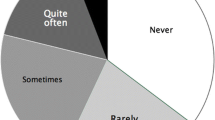Conclusions
The preceding arguments illustrate the inability to adeguately account for the notion of temperance through mainstream contemporary economics. They also bring to light additional anomalies concerning other intangible virtues, e.g., truth, beauty, and knowledge. However, the problems associated with discounting such concepts do not negate the importance of material concerns. Just as people must crawl before they walk, so must they be able to eat before they can think. Before human beings attempt to exercise virtuous qualities in their daily lives, they must first satisfy some level of the basic needs for survival. Without realizing this necessary condition, the search for virtues, particularly temperance, is meaningless.
In highly developed, industrialized societies there is no overriding concern for the society’s ability to meet the basic needs of people. In fact, there is an overabundance of commodities which have generated circumspection about Galbraith’s “created wants” and Veblen’s “conspicuous consumption.” The implication is that less attention should be devoted to materialistic activities and more to intangible considerations.
This observation is related closely to the initial assumption that social theories can significantly affect people’s actions. An economic structure which predominantly utilizes materialistically-based theories and measures will instill similar attitudes within the general populace. Such beliefs may be debilitating to the extent that they produce the realization of intangible goods and can lead to assorted vices like hedonism and greed.
Similar content being viewed by others
References
Aquinas, St. Thomas.Summa Theologiae, volume 44. Translated by Blackfriars in conjunction with Eyre and Spottiswoode. New York: McGraw Hill Book Company, 1972.
Aristotle.The Works of Aristotle, volume 9. W. Ross, translator and editor. London: Oxford University Press, 1949.
Chipman, J. and Moore, J. “Why an Increase in GNP Need Not Imply an Improvement in Potential Welfare,”Kyklos (1976), pp. 391–418.
Galbraith, J.The Affluent Society. Boston: Houghton Mifflin Company, 1958.
Galbraith, J.The New Industrial State. Boston: Houghton Mifflin Company, 1967.
Marx, K.Writings of the Young Marx on Philosophy and Society. L. Easton and K. Guddat, translators and editors. Garden City, New York: Doubleday and Company, Inc., 1967.
Mill, J.On Liberty. R. McCallum, editor. New York: Oxford, Basil, Blackwell and Mott, Ltd., 1946.
Mill, J.Utilitarianism, in The Utilitarians. Garden City, New York: Doubleday and Company, Inc., 1961.
Plato.Plato. Plochmann, editor. New York: Dell Publishing Company, 1973.
Rawls, J.A Theory of Justice. Cambridge: Harvard University Press, 1971.
Robinson, J.Economic Heresies: Some Qld-Fashioned Questions in Economic Theory. New York: Basic Books, Inc., 1973.
Samuelson, P.Foundations of Economic Analysis. New York: Atheneum, 1976.
Sen, A. “The Welfare Basis of Real Income Comparisons: A Survey,”Journal of Economic Literature (March 1979), pp. 1–45.
Smith, A.An Inguiry into the Nature and Causes of the Wealth of Nations. R. Campbell, et al., editors. Oxford: Clarendon Press, Ltd., 1976.
Smith, A.The Theory of Moral Sentiments. (Reprints of Economic Classics Services.) New York: Augustus M. Kelley, 1966.
Veblen, T.The Theory of the Leisure Class. New York: The Modern Library, Inc., 1934.
Rights and permissions
About this article
Cite this article
Goldberg, I. Temperance and economic assumptions. FSSE 13, 35–50 (1983). https://doi.org/10.1007/BF02973417
Issue Date:
DOI: https://doi.org/10.1007/BF02973417




